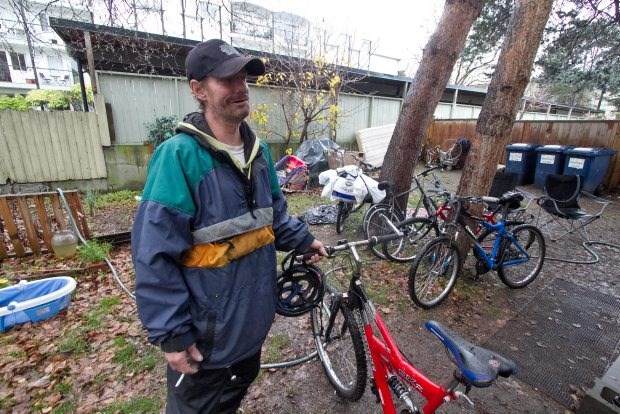Tom Clark says he doesn’t need presents for Christmas — anything he needs he can find at the dump.
“It’s all out there for free,” he says.
Friend Gary Soderman says what Clark needs is a place to live.
Clark, 50, is homeless. He collects $235 a month in social assistance.
Sometimes, he crashes on the couch in Soderman’s Oak Bay Avenue apartment — a worn velveteen sofa, with a top cushion that slides off at one end. Sometimes, he sleeps under trees. It all depends on the weather.
Soderman’s apartment building was constructed as a movie theatre in 1913 and turned into a 10-suite apartment block in 1943. Outside on Oak Bay Avenue, old-fashioned lampposts are decorated with Christmas lights and the stores cater to a more well-heeled clientele.
Inside, on the ground level, the one-bedroom apartments are small, the hallway dimly lit. And the smell is a combination of smoke, age and need — if the latter has a smell.
A few of the people who say they pay $740 a month for a one-bedroom suite here were once homeless. Some fear they’ll be homeless again.
In Soderman’s cramped living room, there are two Santa ornaments on the windowsill and a string of lights from a Christmas past, a desk recovered from the roadside, a beer fridge from the Yukon and two uncovered mattresses piled on top of one another. That’s where Soderman sleeps.
Soderman’s roommate has been in the hospital the last few days.
Clark is looking for his own place to share with a roommate. If he finds a place to live, he could get another $375 from the government for his half of the rent, he says.
Clark is originally from Swan River, Man. He didn’t finish high school and went to work at about age 13, he says. He had two brothers and four sisters; one sister died as a child — he doesn’t know why. His parents are dead.
When he was a child, Clark’s family moved to Kitwanga, northwest of Smithers. His dad drove a truck for a living. His brother died in a car accident on the Skeena.
Clark later worked in the sawmill, making good money at the time — $22.50 an hour, he says. He also worked in the bush, ran a skidder and took related courses.
“I was always on the go,” Clark says. In Kitwanga, he married Sally, who already had four children. The couple had no children together.
“I didn’t want any,” Clark says. “I wouldn’t never really bring someone into this ugly place. It gets harder and harder and harder and it’s not going to get any better.”
Where things went wrong or if they were ever right is hard to tell. Clark was an addict at some point. He says he’s clean now — though he still enjoys his beer and a bit of marijuana, if it comes his way.
Clark and his wife moved to Fort St. John, Victoria, Terrace and back to Victoria. By the time they moved back to Victoria, they were homeless.
The couple is now separated, though Sally lives just doors down from Soderman. And her son lives in a suite upstairs, Clark says.
Two weeks ago, Clark found a set of dishes in the dumpster and brought it to Sally. “I get her everything she needs,” he says. He brought her more stuff this week. In her clean and well-decorated apartment, Sally shows off the black cup from her new set.
Clark says he gets by on refunds from the cans and bottles he collects on his bike and trailer. A lot of mornings, he and Soderman start out at 8:30 a.m.. A few households put their empties aside for him to pick up, he says.
“I go out and collect bottles every day.”
Clark says he has few complaints and needs, with the exception of a trustworthy roommate, and a set of teeth.
For now, Clark and his friends are looking forward to the turkey dinner that will be made possible for them by donations to the Times Colonist Christmas Fund.
-------------------
>> To donate online, go HERE
>> More stories on the Times Colonist Christmas Fund
